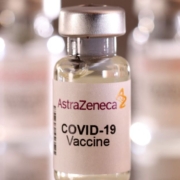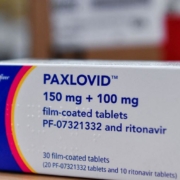A large study into rare blood clots linked with AstraZeneca’s COVID-19 vaccine found between just one and three cases per million, and only after the first dose, shedding fresh light on the side effects from the shot.
The U.S. Centers for Disease Control and Prevention is under fire for failing to publish large swaths of hospitalization data related to the COVID-19 pandemic that the organization has collected but failed to make public.
Synairgen’s inhalable therapy failed in late-stage trial testing in patients hospitalized with COVID-19, wiping out over 85% of the British drugmaker’s stock value on February 21 after the blow to the development of the company’s key product.
Covid-19: A Vision for the “New Normal” and Pfizer’s Paxlovid
CDC, Clinical Trials, Coronavirus Disease (COVID-19) Pandemic, COVID-19 booster shots, COVID-19 shots, COVID-19 Vaccinations, Hospitalized COVID-19 Patients, Immunosuppression, Long COVID, Medicines Patent Pool, New England Journal of Medicine, Omicron BA.2, Paxlovid, R&DEarly in the COVID-19 pandemic, there was a lot of talk about the “new normal,” with most people wanting to get back to the “old normal.” Two-plus years into the pandemic, it’s obvious that COVID-19 is not going away, prompting discussion about what this “new normal” will actually look like.
Washington, D.C. will no longer require people show proof of COVID-19 vaccination to enter many businesses beginning on February 15, its mayor said, joining a slew of local leaders who are dialing back pandemic restrictions as the Omicron wave ebbs.
Prior COVID offers less protection vs Omicron; mRNA booster shot efficacy declines within months
BNT162b2 (Pfizer and BioNTech), CDC, Clinical Data, Coronavirus Disease 2019 (COVID-19) Reinfections, COVID-19 booster shots, Covid-19 Data, COVID-19 shots, COVID-19 Vaccines, Hospitalized COVID-19 Patients, Immune Response, Messenger RNA (mRNA) Vaccines, mRNA-1273/Moderna COVID-19 Vaccine (Moderna), New England Journal of Medicine, Omicron (B.1.1.529) (South Africa), Omicron BA.2, R&DThe immune response to COVID-19 helps protect against reinfection, but that protection is weaker against Omicron than it was against earlier variants of the coronavirus, according to new data. In other news, protection provided by booster shots of the mRNA vaccines from Moderna Inc. or Pfizer Inc. and partner BioNTech SE starts waning quickly, according to data published in Feb. 11th’s Morbidity and Mortality Weekly Report from the U.S. Centers for Disease Control and Prevention (CDC).
China’s medical products regulator said on February 12 it has given conditional approval for Pfizer’s COVID-19 drug Paxlovid, the first oral pill specifically developed to treat the disease to be cleared in the country.
With COVID-19 cases still high nationwide, “now is not the moment” to drop mask mandates in schools and other public places, U.S. Centers for Disease Control and Prevention (CDC) Director Dr. Rochelle Walensky told Reuters on February 8.
COVID-19-Related Stroke Risk and Omicron-Specific Vaccine May Not be Necessary
American Stroke Association, Antibody cocktails, BNT162b2 (Pfizer and BioNTech), Clinical Trials, Coronavirus Disease 2019 (COVID-19), COVID-19 booster shots, COVID-19 Studies, COVID-19 Vaccinations, COVID-19 Vaccines, Hospitalized COVID-19 Patients, Inhaled Formulations, Investigational New Drug (IND), Moderna, mRNA-1273/Moderna COVID-19 Vaccine (Moderna), Omicron (B.1.1.529) (South Africa), Primates, R&D, South Africa, StrokesA new study by the American Stroke Association found that the risk of stroke in adults with COVID-19 between the ages of 65 to 74 was highest the first three days after diagnosis. Additionally, investigators at the National Institutes of Allergy and Infectious Diseases’ Vaccine Research Center ran tests on primates and found that updating COVID-19 vaccines to focus on the Omicron variant may not provide much benefit.
Eli Lilly says FDA could deny expanded use of arthritis drug for eczema
AbbVie, Aopecia Areata, Arthritis, Blockbusters, Clinical Trials, Eczema, Eli Lilly, FDA, Hair Loss, Hospitalized COVID-19 Patients, Janus Kinase (JAK) Inhibitors, New Indications, Pfizer, Priority Review Status, R&D, Rivalries, TherapeuticsEli Lilly said on Jan. 28 the company expects the U.S. Food and Drug Administration to decline the approval of expanded use of the rheumatoid arthritis drug Olumiant as a treatment for adults with moderate-to-severe eczema.









